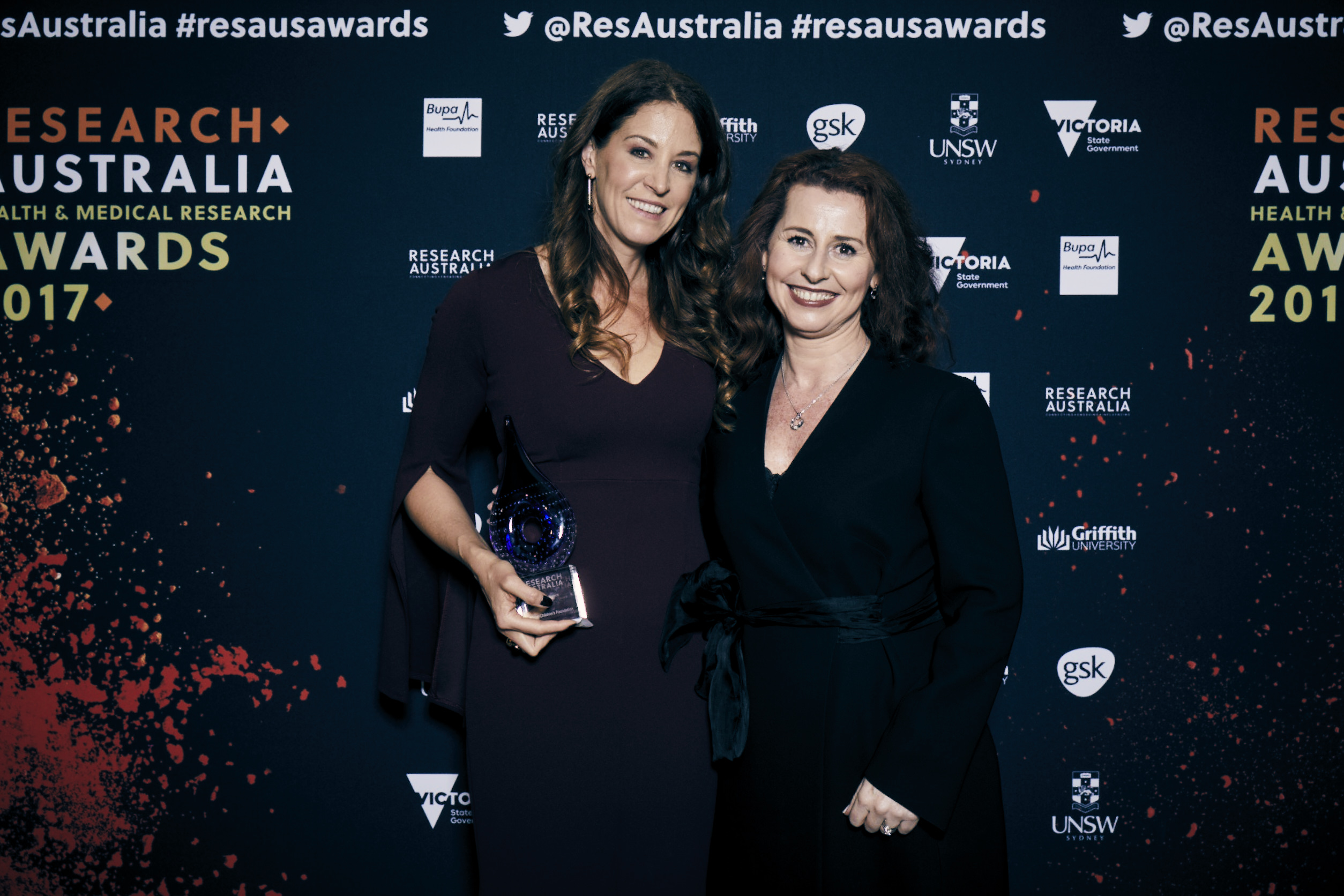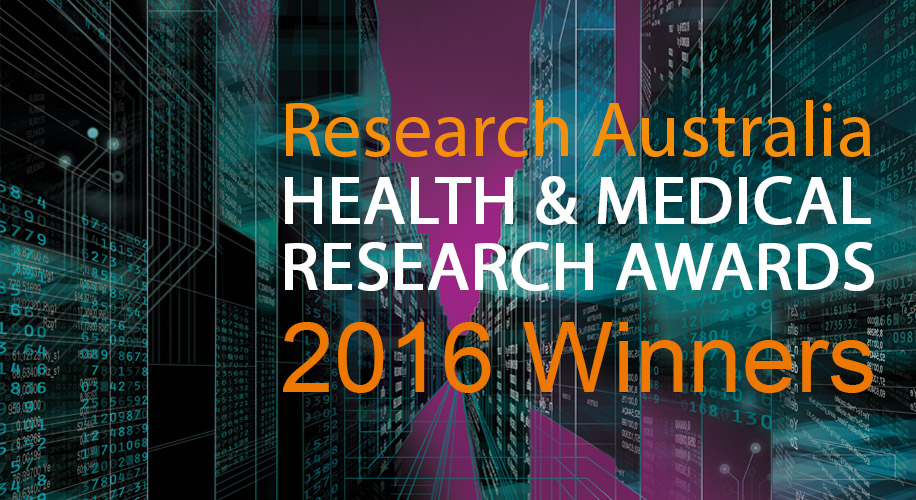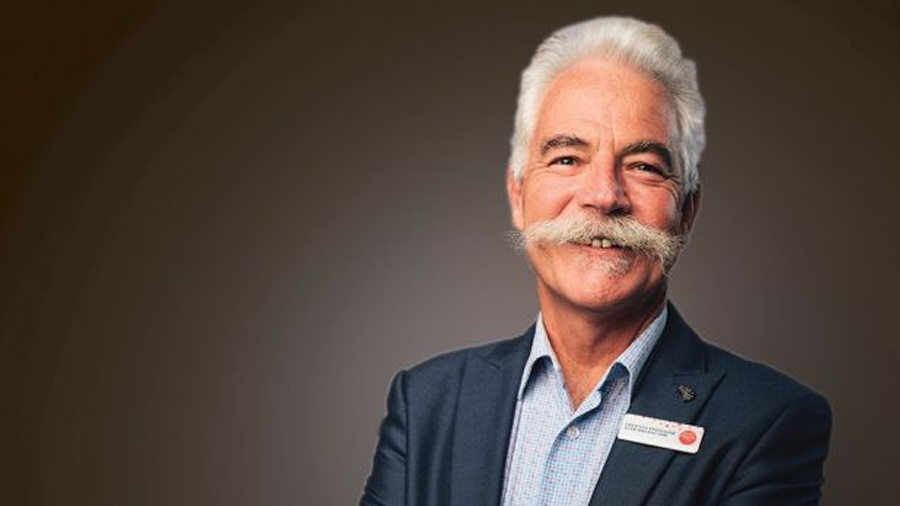Research Australia is delighted to announce the results of the 2017 annual Health and Medical Research Awards, now in its 15th year.
Acknowledging talent and excellence in our sector is not only a key part of Research Australia’s role in advocacy for health and medical research, it is also paramount to encouraging future generations of great researchers.
We are proud to announce the winners in the following categories:
The Peter Wills Award | Professor Kim Mulholland
The Peter Wills Medal recognises an Australian who has made an outstanding contribution to building Australia’s international reputation in health and medical research and fostering collaboration for better health. Professor Kim Mulholland’s work truly illustrates this achievement.
His work with the World Health Organisation and other research organisations on childhood pneumonia, malnutrition and the links between the two with the World Health Organisation and others has led to new approaches that save the lives of children every day in developing countries.
Professor Mulholland’s global contributions past and current, continue today with studies underway in many countries including Vietnam and Mongolia and demonstrate not only his professional commitment to managing this disease but his dedication to its eradication.
In addition to Professor Mulholland’s global achievements, he has also established the Centre for International Child Health in Melbourne and his influential contributions have enhanced the reputation of the Murdoch Children’s Research Institute as an international leader in global child health.
He encourages and formally mentors junior colleagues in many countries including in Australia and several of his former students are now making impressive contributions themselves.
He continues to develop new areas of research, including into respiratory syncytial virus vaccines, human papillomavirus vaccines and the health effects of extreme air pollution. With each new project he provides opportunities for young researchers to enter the field.
Advocacy Award | Sanfilippo Children’s Foundation
Sanfilippo Syndrome is an extremely rare, genetic disorder which causes progressive brain damage. The prognosis for Sanfilippo children is dire: there is no cure. Reeling from the news that her two children had been diagnosed with Sanfilippo Syndrome, Megan Donnell resigned from her role as a management consultant to establish the Sanfilippo Children’s Foundation. In the four years since its establishment, the Foundation has raised close to $3 million in support of its mission to fund medical research into Sanfilippo Syndrome.
By shining a light on this rare and terrible condition, Megan has shone a light on the role health and medical research can play in alleviating the suffering of so many families.
Data Innovation Award | Professor Helmut Butzkueven
Multiple Sclerosis is a debilitating and deadly disease affecting 23,000 Australians and millions more worldwide. The search for a cure is relentless, and in the meantime, a range of different treatments are offered to people with MS to reduce the symptoms, delay the onset and improve quality of life. But which treatments work best and why do some treatments work better for some people than others?
This is the question that Melbourne University’s Professor Helmut Butzkueven is answering, and his work with MS Base has been recognised with Research Australia’s 2017 Data Innovation Award. MS Base has been crucial to defining the real world outcomes for people with MS and providing the necessary evidence to transform the clinical management of MS.
It has led to the development of consensus guidelines for the treatment of MS patients worldwide, which would not have been possible without the data from MS Base. And none of this would have been possible without the original vision and ongoing drive of Professor Butzkueven.
Great Australian Philanthropy Award | Andrew Forrest AO and Nicola Forrest
The Great Australian Philanthropy Award was awarded to Mr Andrew Forrest AO and Mrs Nicola Forrest for their leadership in giving with impact and offering examples of good practice to encourage further social giving.
This follows their work through the Minderoo Foundation and the announcement in May of one of the Australia’s largest private donations totalling $400m. This includes $75 million specifically earmarked for the Eliminate Cancer Initiative with funding to be used as planning capital to unite, encourage and reward the global cancer industry to collaborate and coordinate their efforts and specialise their focus to accelerate research, development, clinical trials and cancer care delivery.
Andrew and Nicola have been researching every possible way they can improve health and medical research in our country to make the largest difference; they are delighted they are able to do so and hope they are encouraging future philanthropy for research in Australia.
Griffith University Discovery Award | Dr Avnika Rubarelia, Monash University
Dr Avnika Ruparelia received the Griffith University Discovery Award for her ground-breaking research into the causes and therapeutics for a group of late-onset muscle disorders known as myofibrillar myopathies.
Seventy per cent of human genes are found in zebrafish and it’s this incredible commonality which has helped Monash University early career researcher Dr Avnika Ruparelia to better understand the causes of progressive muscle weakness.
Patients affected with myofibrillar myopathies have reduced life expectancy due to respiratory muscle failure and cardiac complications. There is currently no treatment and very little research being done to explore new therapies. Dr Ruparelia’s has identified the origins and development of the disease to develop better treatment options, which could potentially prevent any further muscle damage in patients affected with the disease. Her research has provided hope to patients and to their families.
Health Services Research Award | Australian & New Zealand Hip Fracture Registry
Falling over and breaking any bone, let alone your hip, is not something any of us want to think about, but it is all too often the reality for older people.
The ANZ Hip Fracture Registry is working to change this. By collecting and analysing information about patients who have suffered hip fractures the team at the ANZHRF is helping develop strategies to prevent hip fractures and to improve the recovery of patients when they do happen. With more than 12,000 records from patients in Australia and New Zealand, the Registry sheds light on what works and what doesn’t, highlights differences in treatment at different locations, and points the way to best practice. And it is making a difference, changing the treatment patients receive.
The importance of this work has been recognised with Research Australia’s 2017 Health Services Research Award.
Leadership in Corporate Giving Award | The QBE Foundation
Winner of the 2107 Leadership in Corporate Giving Award is The QBE Foundation. A global initiative to help QBE Insurance give back to the communities in which it operates through charity partnerships, donations and volunteering, The QBE Foundation was launched in 2011 to mark QBE’s 125th anniversary year.
The QBE Foundation’s core philosophy is to ‘Help people overcome disadvantage, strengthen their abilities and live more independently, successfully and productively.’ QBE Australia and New Zealand supports the community through volunteering and provides philanthropic support.
Each year QBE Foundation forms partnerships with a number of charities with which it then works closely in an effort to make a more significant and meaningful impact on their cause. The 2017 charity partners are Assistance Dogs Australia, Brainwave; Camp Quality; Foodbank; The Big Issue and The Kids’ Cancer Project.
Pictured top: Megan Donnell, Founder, Sanfilippo Children’s Foundation and Nadia Levin, CEO, Research Australia




